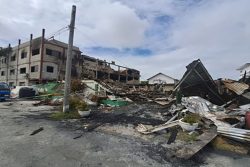Dear Editor,
Suicide is a major public health problem in Guyana, but not much attention is placed on this social issue to lower, if not eradicate, it altogether. Guyana had (probably still has) the dubious distinction of having the highest number of suicides in the world (41 per 100,000, 2019 figures). These figures may be under-reported because many suicides are not reported to the authorities for various reasons – stigma, religious beliefs, shame, etc. Families of victims cover up suicides and attempts by a family member taking his or her own life. Thus, the actual number of suicides may be higher. Figures for more recent years are not reported. It is a crisis that need immediate government attention.
Suicide is not my specialty, but I am concerned about its impact on family and society. I remember from a required psychology course over 47 years ago that suicide is a very complex human behaviour with no single causative factor. But regardless of the factors, except maybe for extreme mental illness, it can be attacked with persistent counseling. It requires a government commitment with resources and individuals who care for life. Several organizations approached me for financial assistance to address suicide and a host of social issues, and I helped as much as I could afford. When advised to seek government assistance, their response is “Government does not care and does not offer required help”. I know of this typical response because for over three decades I approached governments to fund organizations involved in anti-suicide work. The assistance was miniscule.
Based on my investigations and conversations with people on the coast, suicides in rural areas are much higher than urban or semi-urban and suburban areas. Suicides among Indians are much higher than other ethnic groups. At one time, Berbice was once seen as Guyana’s and the world’s capital for suicides; it may still be so. Freddie Kissoon used to lament about the high suicide rate on the Corentyne. I am witness to non-Indian poking fun when Indians committed suicide.
What is clear is that the trend reveals suicide rate has increased over the years and it is very high among the youths and the poor, but all classes are presented in the figures. No government seemed to show much concern about suicide even though it impacts political support. Buying votes or spending money to win over votes is more attractive than spending money to address suicides. The bulk of work against suicides have been undertaken by non-government organizations (NGOs). Caribbean Voice, among others, have done yeoman voluntary service to help save lives in addition to their cherished work counseling victims of domestic, alcohol, and substance abuse.
Regrettably, politicians, political parties, and governments are more interested in power and material projects rather than in saving lives of those contemplating suicide. Appeal to Indian politicians to address this tragic problem fell on deaf ear. Suicide is a loss to family, neighbourhood, friends, the economy, and future earnings as well as talent of the country. It is also a loss of support for a political party. Victims are potential voters and while it may impact one party more than another, the entire country loses. One suicide is too many. Government should commit more resources and redouble efforts to address this critical problem. NGOs are on the ground tackling suicide but are handicapped with limited resources. Government should fund those NGOs that are committed to saving lives.
Sincerely,
Vishnu Bisram







